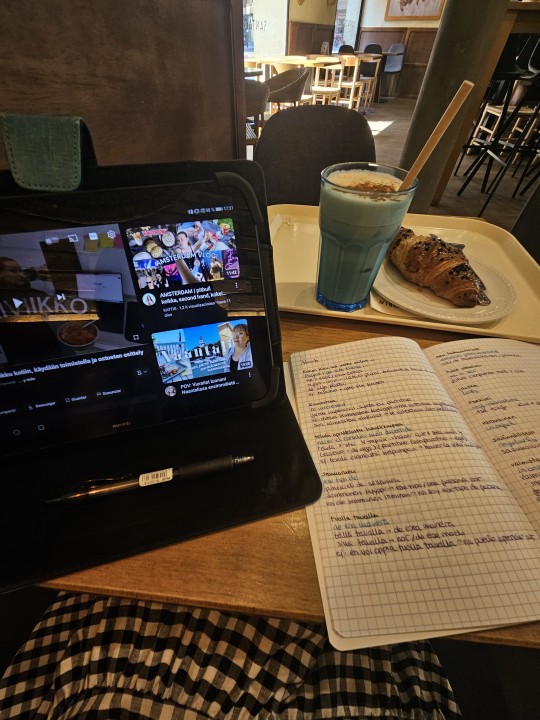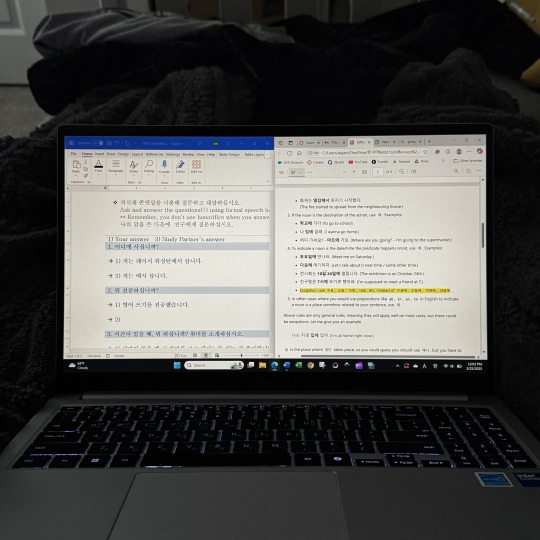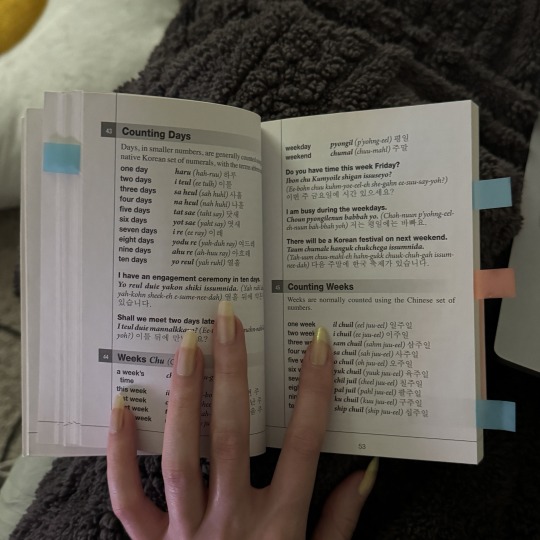#Languageblr
Explore tagged Tumblr posts
Text
Ego, Miettam leviter pedis latere tangens: Mietta, movere, ne in te incurram
Mietta, oculis magnis: tu Miettae calcem IMPINGIS? illius corpori sicut folli calcem impingis?! eheu! eheu! In carcerem Mater conjiciatur! In carcerem in Mille Annos conjiciatur!!!!

Millions of thanks to @alda-rana for a much, much better translation
#the grammar is so off. alas. just pretend its vulgar latin or some shit. i beg.#miette#Mietta is miette#latin be weird w names kinda#shitpost#latin#latin shitpost#latinposting#language#languageblr#romans#roman empire#romanposting#history meme
17K notes
·
View notes
Text
Yiddish isn’t a dying language; Yiddish is a language recovering from an assassination attempt.
EDIT- OP is currently in Israel volunteering with Israeli kids displaced because of bombing. If that bothers you please do not reblog.
#and it will recover#because it has millions of Jewish mothers to make it soup and as if it needs more blankets#Jews have agency so we will be preserving and nurturing our traditions as per usual#jumblr#yiddish#languageblr#Jewish
1K notes
·
View notes
Text
🐾 Baby-talk Mandarin for Talking to Your Cat
What are you even doing? 你在干嘛嘛~? Nǐ zài gàn má ma~? You doing what mm? Whatchu doin’, hmm~?
What do you even know? 你知道啥呀~? Nǐ zhīdào shá ya~? You know what eh? What do you even knooow~?
You don’t even care. 你才不在乎嘞~ Nǐ cái bú zàihu lei~ You totally don’t care eh. You don’t even caaare~
This cat has a death wish. 这只猫咪不想活啦! Zhè zhī māomī bù xiǎng huó la! This kitty doesn’t wanna live anymore! This kitty’s got a death wishhh~!
Trying to trip me, I see. 你是不是想绊倒我哇~? Nǐ shì bú shì xiǎng bàndǎo wǒ wa~? Are you trying to trip me eh~? You tryin’ to trip me again, huhhh~?
Why are you trying to trip me? 为啥老是想绊妈妈啦? Wèi shá lǎoshì xiǎng bàn māma la? Why always trying to trip mama~? Why you always trippin’ mamaaa?
She’s a good girl. 她是个乖乖喵~ Tā shì ge guāiguāi miāo~ She’s a good good kitty~ She’s a gooood girl~
She’s just a baby, your honor. 她她她只是个小宝贝嘛,法官大人~ Tā tā tā zhǐshì ge xiǎo bǎobèi ma, fǎguān dàren~ She she she is just a lil baby, Your Honor~ She’s just a widdle baaaby, your hooonor~
She’s just a baby girl. 她是小小女孩呀~ Tā shì xiǎoxiǎo nǚhái ya~ She’s lil-lil girl~ She’s just a baby girrrrl~
I love you so much, cat. 猫猫,我好爱你呦~ Māomāo, wǒ hǎo ài nǐ yōu~ Kitty, I love you so much yo~ I wuv you soooo much, kittyyy~
She’s purring. 她在呼噜噜噜啦~ Tā zài hūlū lūlū la~ She’s purring-purring~ She goin’ purr purr purr~!
Do you want some snacks? 要不要吃小零零呀? Yào bú yào chī xiǎo línglíng ya? Wanna eat some lil snackies~? You want some snaccies, hmm?
True to form. 你就是你喽~ Nǐ jiùshì nǐ lou~ You just you, huh~ That’s my lil chaos queen~
Come on (the bed). 来嘛,上床床~ Lái ma, shàng chuángchuáng~ Come eh, get on bed-bed~ C’mere, get on the beddy-bed!
Come on, Paz. Paz宝贝,快点儿嘛~ Paz bǎobèi, kuàidiǎnr ma~ Paz baby, hurry up eh~ Come on, Pazzy babyyy~
👶 Notes on Cutesy Mandarin
Reduplication is often used in baby-talk or pet-talk:
床 → 床床 (chuángchuáng – “bed-bed”)
抱 → 抱抱 (bàobào – “hug-hug”)
吃 → 吃吃 (chīchī – “eat-eat”)
Final particles like:
��� (ma), 啦 (la), 呀 (ya), 哇 (wa), 呦 (yo), and 喽 (lou) add playfulness or whining/emotive tone
Small suffixes like 小 (xiǎo – little), 宝贝 (bǎobèi – baby/darling), or 喵 (miāo – meow/kitty) are affectionate and common when talking to pets
#this is honestly kinda ridiculous lol#mandarin#mandarin studyblr#chinese#mandarin chinese#chinese grammar#chinese langblr#languageblr#中文#langblr#learn chinese#language learning#chinese language#cutesy
189 notes
·
View notes
Text
"Irish is a dead language" "no one uses irish anymore" you can pry this language from my cold dead hands. It's not dead and if it was I would still love it (my ancient greek and latin homies know what's up)
Is breá liom ag caint gailege agus ní féidir leat stad mé <33
#irish#irish langblr#irish language#gaeilge#irish history#langblr#languageblr#language learning#language study
467 notes
·
View notes
Text


[03.07.25, thursday]
Finally gathered the energy to go out after bedrotting for a while (deserved tho, I went in a one-day trip to Madrid, hence the museum pic! very nice but incredibly exhausting). Took myself to the bookstore, finally got my hands on the new V. E. Schwab after it being sold out everywhere, and then my usual coffee place.
Wasn't in the mood for grammar nor textbook, so watched couple youtube videos and wrote down phrases and parragraphs so I could translate later (not pictured in the photo since I already finished my drink and food by that time haha)
I was pretty happy with how much I was understanding! So probably will continue doing the same the next days. Also still being consistent with the finnish tiktok scroll, the videos being shorter makes it seem like a less tedious task, and I feel more motivated to do so couple times during the day :)
102 notes
·
View notes
Text
accommodations i’ve had approved as an autistic college student
helloooo today i finally had a meeting with the disability office and have accommodations after 2 years of being in college without them. im autistic and have cptsd/dissociative issues and had a hard time finding what was even available to me to request for accommodations so i wanted to make a list to help anyone else who might be having trouble.
• Priority registration
i get to register for classes earlier each term to make sure i can create schedules that’ll work for my routine
• Extended time on assignments
self explanatory i think? was also offered extended time on tests or a separate room to take them but testing isnt where i struggle
• Flexible attendance
as long as i email beforehand i dont have to stick as strictly to professors attendance policies
• Alternative formats
if i buy a physical textbook i can request the ebook/pdf/audiobook for free to have multiple methods of studying depending on what works for me on a given day
• Note taking
allowed to audio record class and send to a service called messenger pigeon who will give me a transcript of the class and professional notes based on it
• Access to lecture notes
able to access professors lecture notes prior to class/instruction
• Devices
allowed to have phone/ipad/laptop for social buffering and notes in classes that may have policies against electronics
• Flexible participation
no cold calling, option to work alone for group projects/assignments, not required to present in front of class
if anyone has any questions lmk these are just what i have been able to get at my school so far! hope it helps
edit: this is blowing up so fellow autistics, students, language nerds, etc pls be my mutual i want friends lol my dms are also open any time !!
#studyblr#study blog#langblr#langblog#language learning#languageblr#anthropology#anthro#actually autistic#autism#autistic adult#autistic community#autistic student#studyinspo#study help#studyblr community#study tips#study motivation#studyspo#study inspiration#college#student life
2K notes
·
View notes
Text


grammar practise
Another day another round of studying croatian. I found a different workbook online which not only covers the grammar rules but also provides practise questions. The solutions from the book were incorrect (their translations didn’t match the sentences + vocabulary at all) but I’m still quite glad to have found a few practise tasks :)! I worked on translating and creating present tenses of verbs - so far so good. + I had this absolutely incredible tasting apple pie🥧
Now onto: studying math, (finally) filling out the application for my final exams
#finn is studying#high school#high school students#high school studyblr#studyblr#high school senior#studying#studyspo#study aesthetic#do your homework#i have homework to do#studying inspiration#study blog#study motivation#study inspiration#study notes#languageblr#language learning#language#apple pie#honest studyblr#dark academia#dark aesthetic#academia aesthetic#academia#studying inspo#grammar#january#100 days of productivity#digital notes
189 notes
·
View notes
Text
I bring a sort of “Languages are defined by the speakers, not academic institutions” vibe to linguistics conversations that conservative linguistic purists don’t like
#yes this is about The Académie Française#all my homies hate The Académie Française#L’Académie Française#< idk if that’s right srry#The French academy#Académie Française#french#french language#linguistics tag#linguist humor#lingblr#linguistics#linguistics posting#languageblr#langauge learning#language blog#langblog#linguistic purism
75 notes
·
View notes
Text
Don’t fear unknown words
(Note: With this post I just want to share thoughts and tips based on my own experiences and observations. If you have a different opinion that's fine. Language learning is an very individual process. Everyone has different goals and preferences. Try different things and do what works best for you.) Reading is an effective way to increase your vocabulary. But the really interesting books are often very difficult for a language learner (especially if you have little to no experience with native level books). Looking at a page full of unknown words can be intimidating. And if it’s a physical book, reading even a few pages takes ages if you need to look up many words. Reading texts above your current level can be slow and difficult.
From time to time I see language learners who tend to avoid books for natives and keep studying from textbooks or apps to “prepare“ themselves until they are “ready“. And I understand their decision. Textbooks and language learning apps provide structure and present the language in manageable chunks. They are an important first step and they can be a great resource for intermediate learners. Please use them to learn the basics and as a reference but keep in mind that they can only get you to a certain level. It’s obvious, but books for native speakers are not written with language test levels in mind (in the case of Japanese the JLPT). A book for natives can contain words of all levels. For example: The language used in books for a young audience is usually easier than for adults, but even books for kids can contain words that are not in your textbook. On the other hand, novels for adults contain not only abstract and specialized words but also many common words you probably already know. To put it simply: There are no strict levels in the "wild". That’s why you need to learn to deal with the language outside of textbooks. These resources help but they just can’t teach you everything. I mean, it would be extremely unrealistic to expect that you just need to study enough textbooks or completing all levels of your language learning app and then you are able to understand any novel for adult natives without look ups. If you want to learn to read at the level of an adult native speaker, you need to face this challenge and start reading these books at some point — and I mean many of them. No matter how much you prepared yourself through textbooks and apps, you will run into a ton of new words and phrases. This is intimidating at first, but there’s no way around it. You learn simply as you go by trying your best to understand and looking up words, phrases and grammar points. If you are only used to textbooks and apps, it’s absolutely normal that you struggle for quite some time. Don't worry! It gets easier the more you expose yourself with content for native speakers.
What is intimidating today will feel normal for you in the future. Keep going, don’t fear challenges, be open minded and take your time — and you will be able to tackle more and more difficult content.
Tips and recommendations

I myself am at a point where I’ve read around 100 books in Japanese. Many of them were manga, the rest were light novels, novels and a few non-fiction books. The level of difficulty of these books varies. I started with easier books and tried to read more and more challenging ones. I also regularly play video games in Japanese. A few examples:
Manga
名探偵コナン (has full furigana, it’s quite challenging but you’ll learn a ton of expressions and words from a wide range of real wold topics, strongly recommend it)
ナルト (typical battle shonen manga, full furigana, much easier than コナン)
Silver Spoon (full furigana, lots of specialized vocab and therefore difficult, but also very fun)
バクマン (one of my favorites, very enjoyable but also difficult)
らんま 1/2 (I love this series, it has full furigana and is one of the easier manga I've read so far; just be prepared that it contains a bunch of "fantasy" words like attack names etc.)
Novels and Light Novels
ハイキュウ 小説版 (this was challenging at first because the author uses a quite rich vocabulary, the stories are not very complex though)
名探偵コナン (I’ve read several novel versions of the Detective Conan movies, the writing style is quite easy to understand, they cover various topics and they have full furigana, I strongly recommend them)
ハリー・ポッター 1 to 4 (the beginning was hard and sometimes I was a bit lost what happens but the overall difficulty is okay; there are also audiobooks on Audible)
変な家 (I really enjoyed this one, the first chapters are quite easy, only the last one was suddenly very difficult)
Games
Animal Crossing (easy and relaxing game, full furigana)
Ace Attorney (one of my favorites, no furigana, challenging at first but now at Ace Attorney 3 I can play it with only occasional look ups)
Even though I’ve read quite a number of books, I’m far from fluent. I'm currently reading several books: 夏へのトンネル、さよならの出口, リング and ソードアート・オンライン 1. Even with all my experience, there are many new words in all of them. Maybe I should be better at this point, but it is what it is.
However, this is no reason to panic. I think that it’s important to not fear unknown words. New words are not a barrier, they help you grow. Instead of worrying about all these unknown words I take my time, look up words and follow the story. I can enjoy these books even though I don’t understand everything and need to look up many words.
To me, it’s about the journey, not the goal.
Some tips and strategies
Pick a book you’ve already liked reading in your native language (or after watching the movie). This way, you can be sure that you will like the story. This makes looking up many words more bearable. Plus, knowing the story makes it easier to understand the novel in your target language.
If possible, choose the ebook version. Reading digitally makes look ups faster and therefore less frustrating. Because it’s almost effortless you can look up many words without burning out. And by looking up more, there are more opportunities to learn new words.
Decide how many words you want to look up per page depending on your needs. Looking up words digitally is fast and almost effortless. This way it’s not hard to look up every word you don’t know. But if this is too much for your taste, just set a limit that makes reading more comfortable for you. You could try to look up only the 3 most important/interesting words per page and see how it goes. Change the number depending on how you feel or how difficult the book is.
It’s okay to not understand 100%. Progress is better than perfection. As long as you read regularly and look up at least some new words, your vocabulary will grow. Don’t worry too much about every single word you don’t know.
Being able to guess words from context is a valuable skill. Try to understand from context first and look up what seems necessary afterwards.
Don’t let yourself get discouraged right away just because you encounter several new words per page. If you start a new book, try to read at least the first chapter. The prologue and the first chapter are usually the hardest, because you need to get used to the authors writing style and the story.
Take as much time as you need. If you lack vocabulary, reading speed is nothing to worry about at this stage. Build up your vocabulary first.
Even if the overall level of difficulty is okay, there can always be paragraphs or chapters where your comprehension suddenly drops. That’s completely normal. Do your best to understand the gist, look up some words and then move on. Focus on the things you can understand.
You don’t need to learn everything the first time you read a book. Don’t worry too much about rare and specialized words, yet. Try to focus on more common words first. Since they come up more often and in different books, they are more useful at this point. Later when you are more advanced, looking up and learning these rather rare words is less overwhelming than in the beginning where everything is new.
A flashcard program like Anki helps to remember words you've encountered during your reading sessions. But instead of adding all new words I recommend to add only words you've seen at least a few times. I put the Japanese word together with an example sentence on the front and reading and meaning on the back. I use it only as a supplement. My daily Anki sessions are between 10 - 15 minutes long. I want to use most of my learning time for reading and listening -- this is where I really learn new words (= by repeatedly seeing them in context). Anki just helps me to build up familiarity with words I already recognize. Anki is not a must, of course. If you really can't stand it, don't use it. Just make sure that you read and listen regulary.
Graded readers can help to get used to reading in your target language. However, the gap between graded readers and easier books for natives can still be quite significant.
#langblr#languagelearning#languageblr#self study#japanese learning#language learning#learning japanese#study japanese#日本語勉強#日本語勉強中
88 notes
·
View notes
Text
Something I've been thinking about these days is that, as language learners, we want to immediately be able to express ourselves in our target language as we do in our native language, but we forget how long it took us to reach this knowledge of our own language too.
When I was a child, I for sure wasn't able to think or understand certain complex Italian words and therefore they weren't part of my vocabulary even if I happened to hear them/read them and ask for their meaning (I couldn't always retain them, also because I didn't had the chance to really use them). But even if I had to express a concept that needed that word, I could still make myself understood by using more and simpler words that meant the same. Or a simpler grammar structure I was sure of.
Even in school, teachers use simple words, and the same simpler words are used in our books. They grow in difficulty as we grow, learn and make experiences too. And more than on words, primary school teachers focus on grammar. That boring annoying grammar (sic!). But that's at the base of our speech, and of every language imo. If we know the words but not how to use them/build a sentence with them correctly, it's only a waste of time imo. And I'm not talking about idiomatic uses or mild differences in connotations, as that too will come with time unless we come across something as we go and can retain it. I'm talking about words like (using my native language here but works for all) "astruso", "gaglioffo", "lapalissiano" or "pleonastico". Unless you're C1/2 in Italian, you shouldn't worry if you can't remember them, even if you came across them. Heck, not even some Italians really know their meanings and for sure we don't use them that much in our everyday talk, so why worry about learning them immediately? Let them go, retain what you really need to make yourself understood in case you found yourself here and eg. needed help or to buy something, or wanted to tell/ask something to someone: doing that with simple words and sentences you are really sure of, or even kind of, it's still better and more comfortable than using unknown words/difficult grammar and risking to be misunderstood.
To make it short: learning the basic/most common words is actually helping me practice my target language's grammar more comfortably, so that I can move onto adding more complex stuff anytime I feel I can. And it's honestly less stressing.
213 notes
·
View notes
Text
Recently I came across a theory, that people (especially writers, poets and creatives) can express themselves better in their second language, because it's stripped off of emotional value, it isn't plagued by your feelings and it's more rational. Well... My heart aches for my mother language (czech), especially the version my family talks in. What do you mean you don't want to be plagued by emotions? Cause I DO. I want my writing to be so infected by them, I want my writing to be so ill with emotion! That's an infectious disease I'll gladly infect myself and my art with. The second language I learned was english. I'll never be able to create fully in it. I always feel like everything I create is only a shadow, a reflection of what may have been. If I can write in the language my grandma spoke to me, in which my mum sung me lullabies and in which my father told me stories, then I will. In the language we speak carries our identity as a society and shapes our understanding.
Protože každý nápad ke mně přichází v mém mateřském, rodném jazyce, pláču v něm a raduju se, tvoří moje vzpomínky. I když forma (ani ne nářečí, ale přímo ta konkrétní část, kterou mluví naše rodina), je hrubší a neučesaná, je mi tak drahá. Ano, ráda budu mluvit nespisovně a vlastně špatně, ale někde v mém srdci mi tenhle jazyk zní jako zpěv. Prostě proto, že je můj.
#language#czech language#first language#česky#hezky česky#čumblr#languageblr#tohle je asi spíš pro mě#potřebovala jsem to někam napsat
142 notes
·
View notes
Text

#langblr#language#language blog#languageblr#language meme#language memes#linguistics#twitter#gostak#syntax#linguistics meme#linguistics humor#who up
195 notes
·
View notes
Text
Wednesday, September 27.
Langblr.
If ever you're in France, accompanied by your kitty cat, and you find yourself unintentionally (and quite unexpectedly) projecting intestinal gas produced within the body by bacteria that has broken down food, and said kitty cat looks a little alarmed, and you don't know what to say, well. Fortune smiles upon you this day. Consider #langblr your knight in shining linguistic armor. Chat, j'ai pété.
It really can happen to anyone. But langblr is here for all your polyglot needs: learning how to say chai tea in Czech, the frankly adorable etymology of peninsula, Greek paleographic fonts, for words of support for those underway with their language-learning adventures, or if you're in need of some support yourself. It is a particularly wholesome corner of Tumblr, for those with an interest in the slow-burn magic of learning another language.

#today on tumblr#langblr#french langblr#language learning#polyglot#foreign languages#learning languages#french language#language#language blog#languageblr#languages#langblog#bilingual#studyblr#catblr#cat#i farted#cat i farted#farty cat#linguistics#etymology#language stuff
1K notes
·
View notes
Text
Fuck it we’re doing a poll. Nobody cheat.
English speakers-

Edit: Upon viewing the initially very high percentage of nos, allow me to add the context here is Jews. We are taking about something related to a certain population of Jews.
86 notes
·
View notes
Text


[19.06.25, thursday]
been slacking with the posts but i'm happy to say that i've been up to date with my lessons, my homework for them, and trying to get back little by little to consuming content.
on today's class we went over various little grammar points, and did some speaking, which i always feel like its my weakest point (i know it's normal but wanna practice so i can improve!)
also bought my (one-way, for now) plane ticket for Finland, for the end of August. i'm more excited that terrified, but i think it's just cause im not processing the fact that im going there for longer than just a one-week vacation off work. don't think it'll become real until the very end, but can't wait for it to arrive :)
115 notes
·
View notes
Text


05.25.2025 — 안녕하세요 여러분. 오늘은 일요일입니다. 오늘은 저는 숙제하고 퀴즈가 있습니다. 이건 “Instant Korean” 책이 마음에 듣습니다.
🎧 Yellow - Coldplay
#한국어#한국어 공부#공부해요#학생#korean studies#studying korean#korean language student#korean language#languageblr#studyblr#college#college student#college work#studying#study day#homework
42 notes
·
View notes